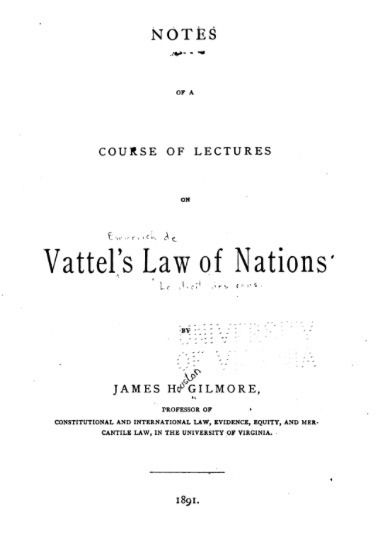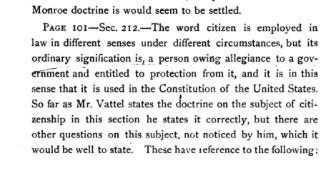


Posted on 01/17/2016 4:37:25 PM PST by BlackFemaleArmyColonel
In recent weeks, much time and effort has been devoted to debating whether Ted Cruz is a "natural born citizen" eligible for the presidency. Whichever way you come down on this question of constitutional interpretation, the real lesson of this debate should be the absurdity of excluding naturalized citizens from the presidency in the first place. Categorically excluding immigrants from the presidency is a form of arbitrary discrimination based on place of birth (or, in a few cases, parentage), which is ultimately little different from discrimination on the basis of race or ethnicity. Both ethnicity and place of birth are morally arbitrary characteristics which do not, in themselves, determine a person's competence or moral fitness for high political office.
The "natural born" citizen requirement was originally inserted into the Constitution because some of the Founders feared that European royalty or nobles might move to the United States, get elected to the presidency, and then use the office to advance the interests of their houses. Whatever the merits of this concern back in the 1780s, it is hardly a plausible scenario today.
One can argue that immigrants have less knowledge of the country and its customs, and might make worse presidents for that reason. But that problem is surely addressed by the constitutional requirement that a candidate for president must have been resident in the United States for at least fourteen years. As a practical matter, anyone who attains the political connections and public recognition needed to make a serious run for the presidency is likely to have at least as much knowledge of the US and American politics as most serious native-born candidates do.
(Excerpt) Read more at washingtonpost.com ...
The word traitor exists for a reason
Well yes, that’s a rather uncontroversial statement. So what?
Is Vattel in the Constitution? No. If not, then his value is persuasive only. That does not get rid of the ambiguity.
........................................................The ambiguity is in your mind and those who would wish to push their progressive agenda, including, but not limited to the U. N. Agenda 21 and all its supporters.
Vattel IS in the Constitution in Section I under the powers of congress.
Vattel Is referenced by no less than John jay, First Chief justice of the Supreme court.
Vattel IS referenced by Benjamin Franklin who distributed copies of The Law of Nations. his correspondence with the printer is self explanatory as to the importance with which the Law of Nations was regarded by the Framers.
One of the Constitutional Delegation clearly stated that British Common Law was NOT the foundation of American law.
Vattel is cited in supreme Court Cases.
Vattel was taught in American law schools from the founding of the country.
There is a mountain of information upholding Vattel. Profit from it. Don’t try to weaken the constitution because of your own comprehension difficulties.
Totally meaningless nonsense today...it's who and what you are that counts, not where you spent the first three days of your life nor where you emerged from your mothers womb.
We have BRILLIANT and more than qualified persons who could lead this country. If a person is of age, and has lived here all his/her life....educated, property owner, extended family here,history of local and state participation in constructive projects....but left his mothers womb 4 miles on the other side of the border.....who cares.
We are considering electing two idiots, Trump and Clinton to be the most powerful person in the world.......that's O.K. with you???????
Why is it so hard to answer a yes or no question. Is Vattel in the Constitution? I read the Constitution and I don’t see “Vattel” in there or “Law of Nations” in there. I see a very ambiguous phrase “natural born citizen” in there, and that tells me that one needs to go to external sources to try and divine what meaning, if any, that term has - i.e., is it some sort of term of art - and for that sources such as Vattel are persuasive only, they are not authoritative.
My loyalty lies with the Constitution, first and always. Why does your loyalty lie first with Vattel?
Vattel was the legal foundation for the constitution where it was needed. Therefore, your question is stupid. It is not I who attempts to disparage the constitution as written, neither do I seek to weaken its boundaries and restrictions on human greed.
How could a child born of two American citizens living in Guam, which is an American territory, American soil, not be constitutionally eligible to hold the office of President, provided he is 35 years old and has lived 14 years in the United States? So the only question would be, it seems to me, would be living in Guam be considered as living in the US?
LOL - Shep for the 4th child. And, while you’re at it, add a 5th child (fred Astaire) born in an American military hospital in Germany. I’ll get this stuff down yet.

Constitutional Law Professor....
So eligibility is decided on a case by case basis rather than by rule. Nah, no opportunity for corruption there.
;)
Just about everything that had been written on law, politics, and etc, contributed to the legal foundation for the Constitution - the Founders were pretty well, and widely, read.
And no, my question is not stupid, it is designed to clarify the discussion by clearing away the haziness and muddy thinking that can come from focusing too much on one’s favored interpretive aids and not enough on the text being interpreted.
The simple answer is this: no, Vattel is not in the Constitution. There is no part of the Constitution that cross-references or otherwise expressly and explicitly incorporates Vattel into the Constitution. Therefore, Vattel’s value is at most persuasive, and as such, may not persuade some of us. Furthermore, even if one grants that Vattel is a source to be used as an aid in interpreting the Constitution, that does not commit one to adopting Vattel. The question still remains whether Vattel’s concepts were, in fact, incorporated into the Constitution, or if it is just a case of convergent evolution of the words used. Finally, there is the question of whether it makes any sense given the entire text and purpose of the Constitution, to incorporate Vattel’s concepts into the Constitution.
That this is how Constitutional interpretation goes shouldn’t be that much of a surprise. The Supreme Court itself engaged in an interesting exercise in the series of cases leading up to the Income Tax Cases that involved the various attempts to put meaning into the phrase “direct tax.” The phrase “direct tax” seems, at first glance, to be deceptively simple, but dig into first the text of the Constitution, then the contemporaneous discussions of, and relating to, the term, and finally the history and political context that the term existed in at the time of the writing of the Constitution, and all appearance of simplicity disappears.
I very much appreciate the compliment, but I must refuse, as I am no professor of any sort. Just someone who likes to start with the text of the Constitution, not my prejudices.
Really? Show me where it says that in the Constitution.
Disclaimer: Opinions posted on Free Republic are those of the individual posters and do not necessarily represent the opinion of Free Republic or its management. All materials posted herein are protected by copyright law and the exemption for fair use of copyrighted works.